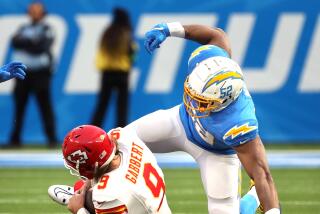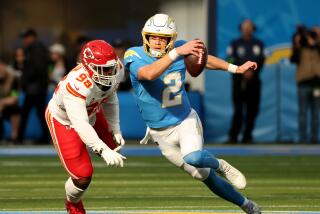Mistakes Offset McMahon High as Chargers Lose
SAN DIEGO — The Chargers made enough mistakes Sunday to ruin the most statistically productive afternoon of Jim McMahon’s storied eight-year NFL career.
They committed 13 penalties for 117 yards. They turned the ball over five times without taking it away once. And for the second consecutive week, their special teams looked like the Keystone Kops.
McMahon passed for 389 yards and two touchdowns while completing 27 of 45 passes. But he also threw three interceptions. One led to a Houston touchdown, another to an Oiler field goal. The two fumbles by McMahon’s running backs also turned into Oiler touchdowns.
“We should have thrown for 500 yards,” McMahon sniffed.
The only other NFL game in which McMahon threw for more than 300 yards was in 1987 against Denver. He lost on that day, too.
This was the second defeat in as many weeks for the Chargers, whose defense has now allowed 74 points and 786 yards in two games. And it was witnessed by the smallest crowd for a home opener--42,013--since absentee owner Alex Spanos bought the team in August 1984.
The final score was Houston 34, Chargers 27.
The Chargers were actually still breathing with 55 seconds left, when Lester Lyles recovered Chris Bahr’s onside kick at the Charger 45 after wide receiver Anthony Miller’s second touchdown reception had cut the lead to seven.
Referee Howard Roe initially awarded the ball to the Chargers but reversed himself, saying Lyles had touched the ball before it traveled the required 10 yards. Replay official Royal Cathcart then reviewed the play from three different angles.
“The replays were inconclusive,” Cathcart told a pool reporter.
So Roe’s call stood. The Oilers promptly ran out the clock.
When the game was over, Charger Coach Dan Henning and Oiler Coach Jerry Glanville didn’t shake hands. Maybe they were too busy shaking their heads.
Henning had watched a 14-3 Charger lead turn into a 34-14 Houston advantage in less than two periods. Glanville had watched replay after replay after replay of the controversial onside kick shown on the stadium scoreboard screen.
“I thought they (the Chargers) were offsides, and I thought they hit the ball before it went 10 yards,” Glanville said.
“I don’t know,” Henning said. “One official said his final decision was our player touched the ball too early. He said our guy (Lyles) took off before the 45 and touched the ball before it went far enough. I can’t argue with his decision if that’s the way he saw it. But if that’s how he saw it, it shouldn’t have gone through two (actually three) reviews.”
Charger defensive back Elvis Patterson insisted the officials shouldn’t have called so many penalties against the Chargers. “I feel they should have let us play football,” he said.
“When are they going to let the players get back to playing instead of the officials playing?”
Houston, the most penalized team in the league last year and last week, committed eight penalties for 70 yards.
It was Patterson’s block of a Greg Montgomery punt that gave the Chargers the ball at the Houston one on the second play of the second period. Moments later, the first of rookie Marion Butts’ two one-yard touchdown bursts put the Chargers on top, 14-3.
Butts has now scored four touchdowns in two weeks. Oddly, he didn’t start against Houston after opening at tailback last week. “Basically it was because they wanted certain individuals to concentrate mainly on special teams,” Butts said. Apparently he was one of them.
The Chargers had taken the lead 10 minutes into the first period when McMahon found Miller uncovered up the left sideline. Miller faked out free safety Tracy Eaton at the Oiler 22 and raced into the end zone to complete the 63-yard play. It was the longest reception by a Charger wide receiver since Wes Chandler’s 75-yarder in 1985.
Before that, the only scoring had been a 24-yard field goal by Oiler kicker Tony Zendejas.
Patterson’s punt block was the lone bright spot for beleaguered special teams Coach Joe Madden. Among other things, Charger special teamers:
--Allowed a 63-yard return on the opening kickoff.
--Roughed the Houston punter.
--Shanked a punt 14 yards out of bounds.
--Mishandled a snap that cost the Chargers an extra point.
Then there was the play on which return man Darryl Usher received a penalty when he grabbed an opponent’s face mask.
“We’ve just got to go back to work and make sure those things don’t kill us,” Henning said.
Houston (1-1) began its comeback with a 14-yard touchdown pass from Warren Moon to Ernest Givins early in the second period. Eight minutes later, rookie running back Victor Floyd fumbled at the Charger 19, and Ray Childress recovered for Houston.
Two plays after that, Moon dived over from the one, and the Oilers had their first lead, 17-14.
Moon finished with 21 completions in 35 attempts for 235 yards. The Chargers never sacked him. Ron Lynn, the Chargers’ defensive coordinator, admitted they didn’t expect the Oilers to stay in their run-and-shoot offense (featuring four wide receivers) for almost three fourths of the game.
Lynn said the run-and-shoot forced the Chargers to drop linebacker Leslie O’Neal into pass coverage while sending a three-man rush after Moon. Glanville said the Chargers’ initial strategy of lining up with eight- and even nine-man defensive fronts forced the Oilers into the four-wide receiver alignment.
After a 32-yard Zendejas field goal made it 20-14 at halftime, Butts fumbled the ball away at the Charger 35 on the first scrimmage play of the third period. This time, Drew Hill beat Charger free safety Vencie Glenn deep in the end zone for a five-yard touchdown. Alonzo Highsmith’s 16-yard touchdown run later in the period made it 34-14.
Fourth-period touchdowns by Butts and Miller turned out to be too little too late. Miller finished with seven catches for 162 yards. H-back Rod Bernstine grabbed eight for 78 yards.
But, McMahon said, “we can’t lose games like this. We have to be smart and hang onto the football.”
And they have to figure out a way to stem the wave of negative publicity that turned into a tidal wave last week when Henning never fully explained why he yanked McMahon from the Raider loss in the third period.
Before this game, somebody unfurled a banner at the south end of the stadium that read: “WELCOME TO ORTMAYER’S HOUSE OF SHAME.” Within minutes of its appearance, a Charger employee, escorted by two police officers, tore the sign down and confiscated it.
The reference in the sign was to Steve Ortmayer, the Chargers’ embattled director of football operations. Ortmayer is in the last year of his contract.
The incident won’t go unnoticed in Stockton, where Spanos resides. Spanos frequently refers to Charger ticket-holders as “my fans.”
Home-opener attendances since Spanos purchased the team are: 1984--52,266; 1985--54,420; 1986--57,726; 1987--47,899; 1988--44,449; 1989--42,013.


